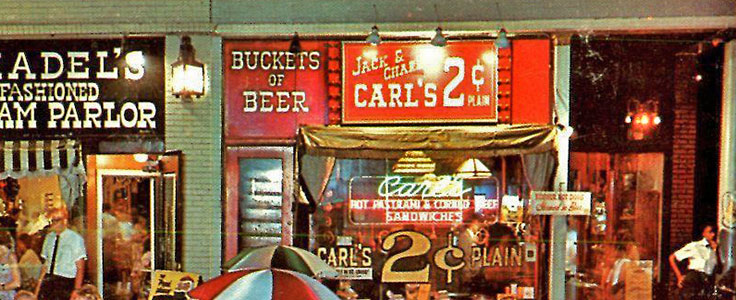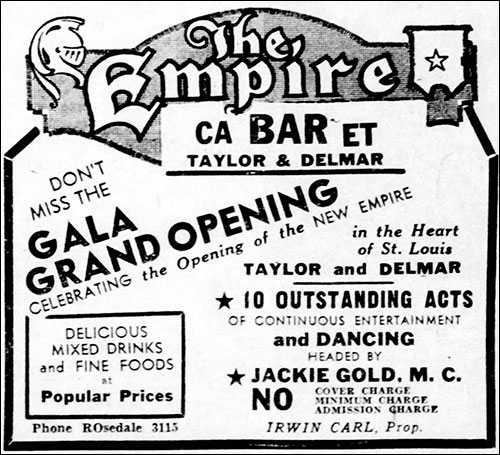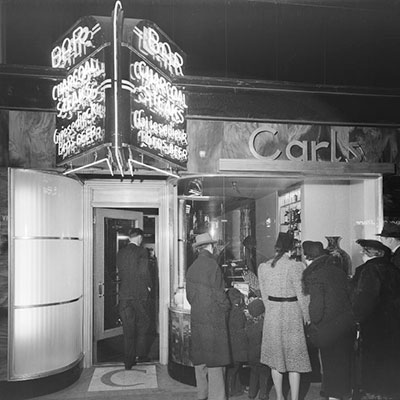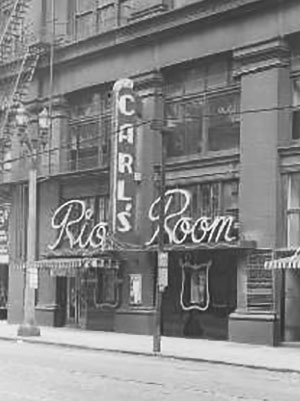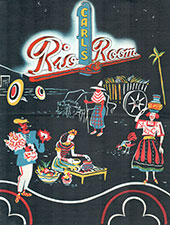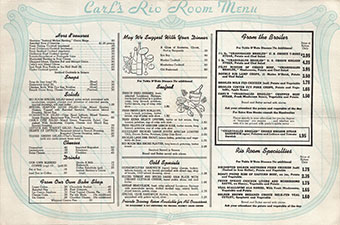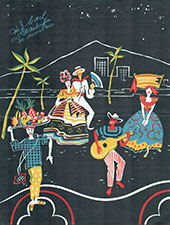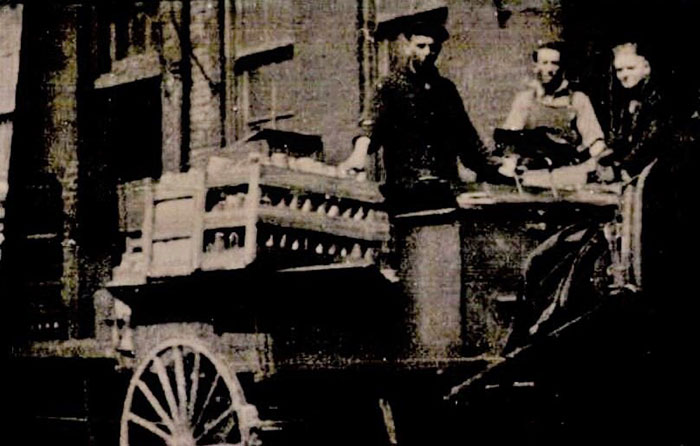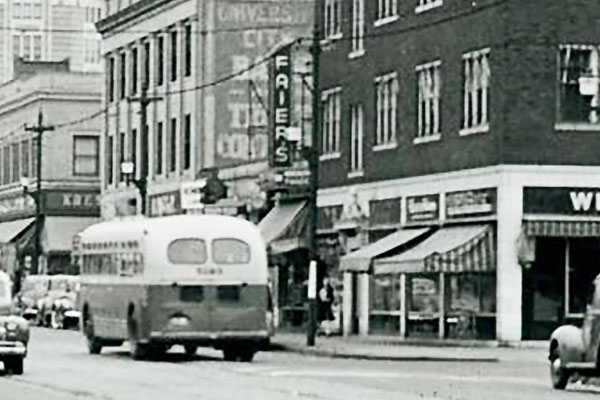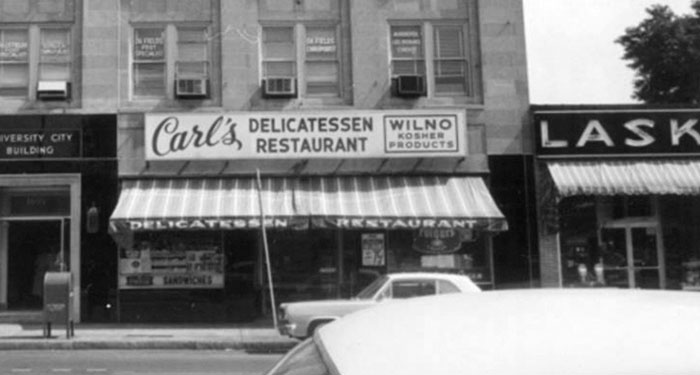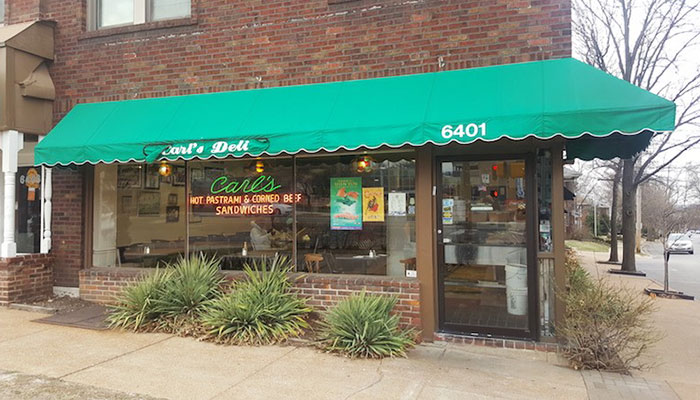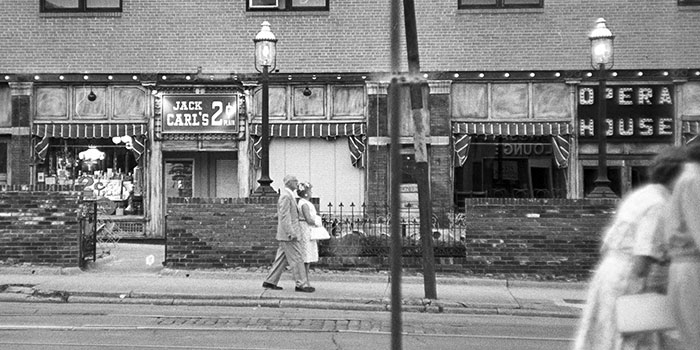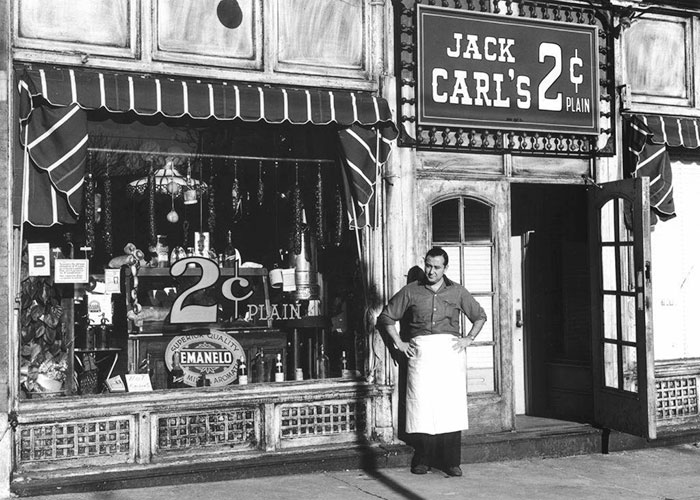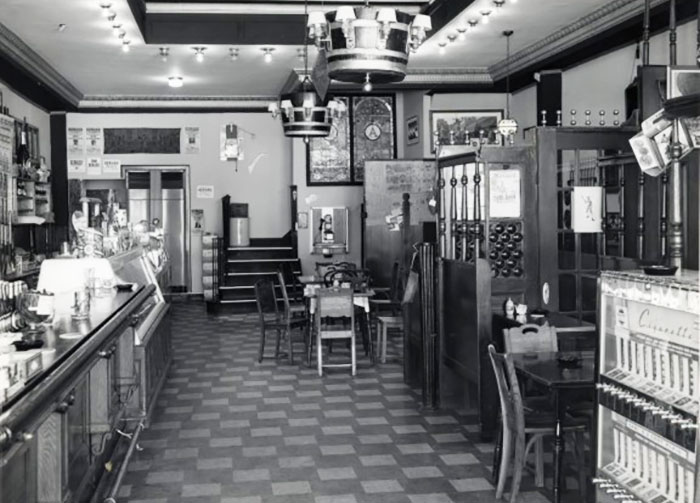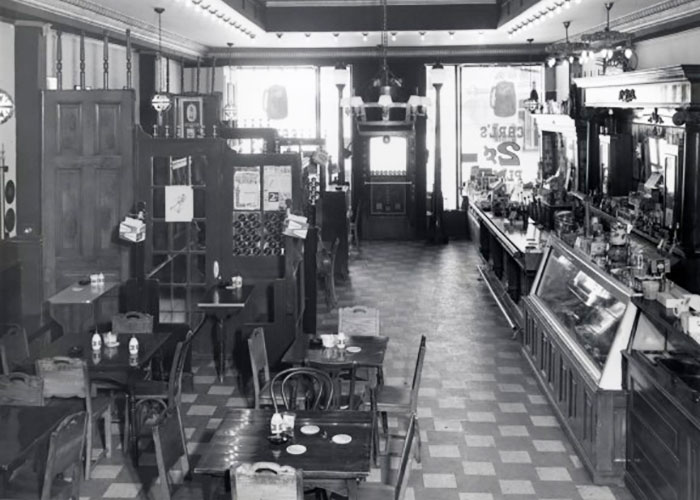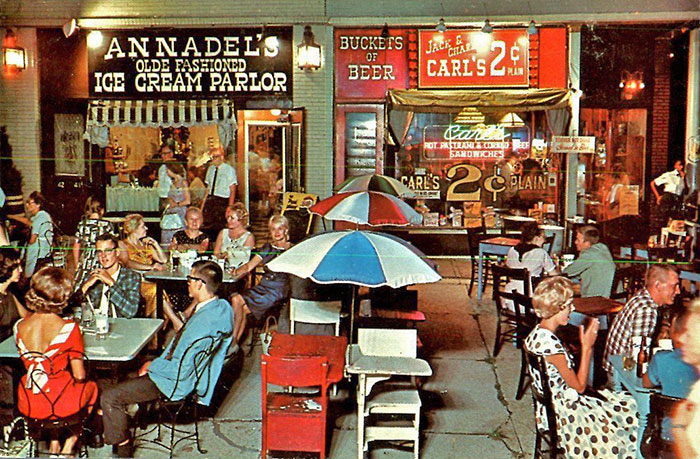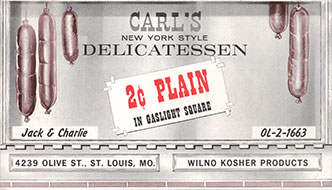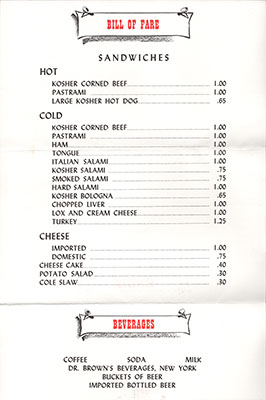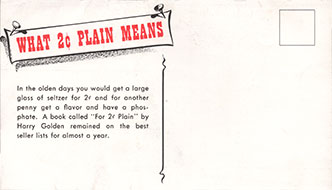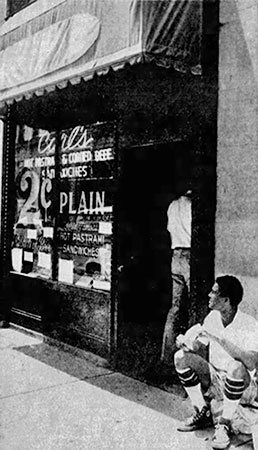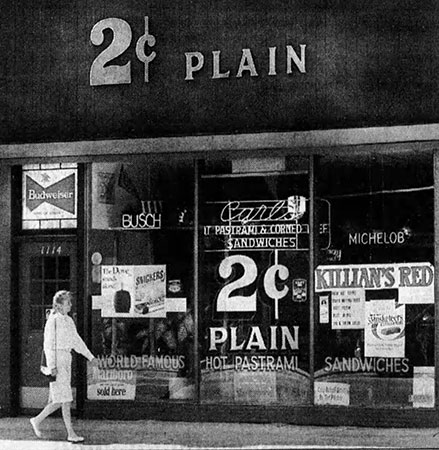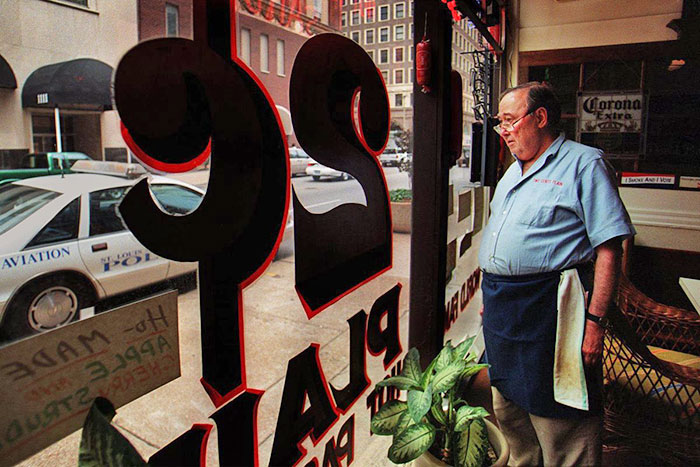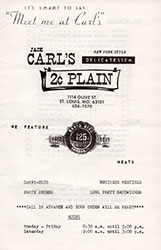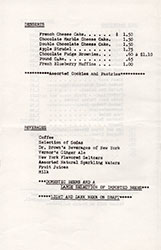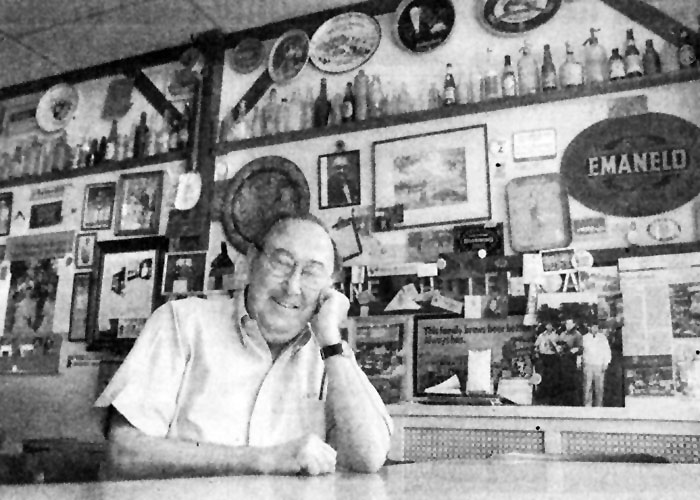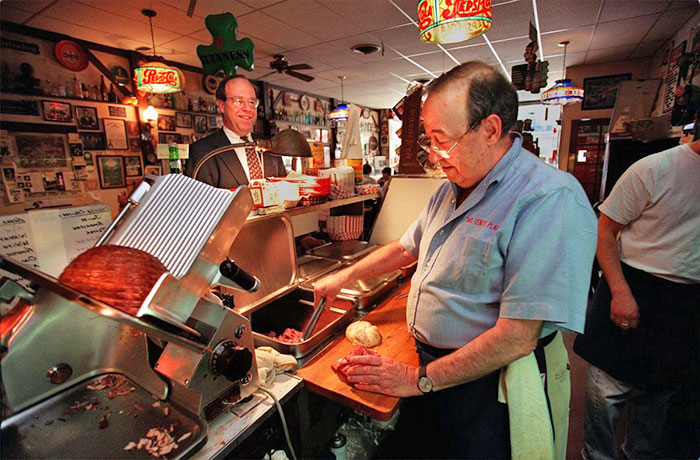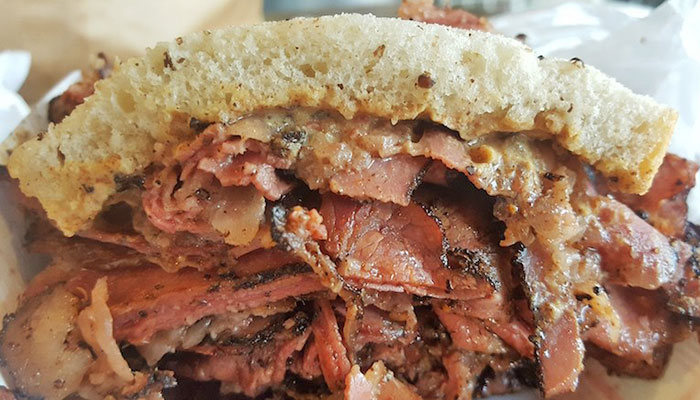|
2¢ Plain Jacob Carl immigrated to the United States from Russia in 1900. After living for a few years in Boston, he moved to St. Louis by 1904. His wife Rose and four children – Bessie, Louis, Max and Annette – joined him in January of 1905. By the end of 1908, the Carls had added two more sons – Joseph and Irwin – to the mix. Joseph Carl, the fifth eldest child and third eldest son, was born in St. Louis in 1906. He died tragically in 1939 while swimming with a friend in the Mississippi River.
Irwin Carl, the youngest child, was born in St.
Louis in 1908. In 1935, he opened the Empire Bar and Liquor Store at
7165 Manchester in Maplewood, which morphed into the Empire Cabaret and moved to
4501 Delmar in 1938. Irwin's brother Joseph was employed
there at the time of his death.
Max Carl, the third eldest child and second
eldest son, was born in Russia in 1899. In the mid 1930s, he
operated The New Yorker tavern at 5911
Easton and 815 Washington. He opened Carl’s
Cocktail Lounge at 709 Washington in 1939 and Carl's Rio Room, an
elaborate cocktail lounge and restaurant, at 1115 Washington in
1947.
Louis Carl was born in Russia in 1896. He was the second eldest of Jacob and Rose Carl's children and their eldest son. Louis and his wife Anna had three children – Bessie was born in 1918, Charles in 1921, William in 1924 and Jack in 1929. Louis Carl started out in the bottle business. His father Jacob worked for the City Bottle Company at 906 North 17th Street. By 1917, Louis and his younger brother Max were working there too.
In 1917, Louis Carl and two partners formed the "Finger & Carl Bottle Company" to "buy and deal in used bottles." By 1923,
Louis Carl was the
sole owner of the "Carl Bottle Company" at 1718 Biddle.
The Carl Bottle Company specialized in "wine, whisky and cordial bottles" and catered to "beer taverns and restaurants." They also sold beer "and plenty of it!" In 1936, Louis Carl was sentenced to two years in Leavenworth penitentiary after pleading guilty to a charge of selling counterfeit internal revenue liquor stamps and bogus whisky labels. Louis Carl survived his brush with the law. The Carl Bottle Company was still at 1718 Biddle in 1940 and moved to 1408 North 17th in 1941. However, it no longer specialized in liquor bottles.
Louis Carl had closed his bottle business by 1945. For a short time, he worked for his brother Max, managing
Carl’s Cocktail Lounge. And then, in 1947, he bought a kosher
delicatessen.
Isadore Faier came to St. Louis from Poland in 1910 and opened a delicatessen at 1512 Franklin Avenue. In the 1920s, he moved his deli to 5749 Easton, and by 1943, Faier's Delicatessen was located at 6629 Delmar in the University City Loop. In 1947, Isadore Faier sold his delicatessen to Louis Carl. Carl and his family received a month's training and then began running the deli on their own.
Carl's Delicatessen prospered; in 1961, it moved
just west into a larger space at 6633 Delmar. All four Carl children
worked at the deli with their parents, although it was William
(Bill) who became his father's right-hand man.
Louis Carl died in November of 1964 at the age of 68. His wife Anna had died the year before and his son Bill had already taken over management of the business.
In 1969, Bill Carl lost his lease in the Delmar
Loop and moved Carl's Delicatessen to the corner of Clayton and DeMun
in Richmond Heights, across the street from Cyrano's.
Jack Carl, the youngest of Louis Carl's children, dropped out of Soldan High School to work at his father's deli in the U City Loop. Before that, he had worked as a busboy for his Uncle Max at Carl’s Cocktail Lounge. Jack Carl was drafted into the Army during the Korean War. He was assigned to the infantry and sent to Korea, where he became a cook. After the war, Jack Carl returned to the deli business. He opened Carl's Food Shop in 1957 at 7731 Clayton Road, just east of Lake Forest Pasty Shop. A second Carl's Food Shop was opened in 1958 at 8501 Delmar, just east of McKnight. However, both delis were short lived. The Clayton location closed in 1959 and The U City location became a Lazy Susan in 1964. In 1960, Jack Carl moved on to Gaslight Square. Carl actually opened two delis in Gaslight Square. The first, "Jack Carl's 2¢ Plain" at 4263 Olive Street, was nestled between the Golden Eagle Saloon and the Opera House. Club owner Jorge Martinez remembered it well.
The Golden Eagle and Opera House were much larger establishments than Jack Carl's 2¢ Plain. In an effort to drive him out of business, they started selling pastrami sandwiches for 65 cents. Carl charged a buck. When the 65-cent sandwiches didn't put him under, they dropped their price to 50 cents. Carl sought an injunction, telling the judge he didn't trust the two big joints to make legitimate pastrami sandwiches because he had been in each establishment late at night and seen the way the bartender poured whiskey from the cheap bottles into more expensive bottles. Carl won. Carl took his neighbors to court a second time when they turned off the electric lights in the rear of his deli, making it difficult for customers to find their way to the restrooms. Carl testified that the darkened restrooms were part of a campaign of harassment by the owners of the Golden Eagle and Opera House, intended to force him out of business. He countered their move by furnishing his customers with flashlights. In 1962, Carl moved away from his pesky neighbors. He relocated six doors east at 4239 Olive, opening "Jack & Charlie Carl's 2¢ Plain" with his brother. The new deli was next door to Annadel's Ice Cream Parlor and across from the Crystal Palace.
Entertainers playing at the Palace used to pop
across the street for sandwiches; many of them became regulars. When
in town, Milton Berle would come in every night for a tongue sandwich.
Senator Abraham Ribicoff, who
didn't like the food at the old Jefferson Hotel, would have Carl
drop off lox and cream cheese for breakfast.
How did Carl come up with
the name of his deli? In Brooklyn, seltzer (carbonated water) was
once a popular drink. At the candy stores, an egg cream (chocolate
syrup, milk and carbonated water) was a nickel, a chocolate soda
(syrup and carbonated water) was three pennies, and for "two cents"
you got "plain" carbonated water. In 1965, Carl opened a second 2¢ Plain downtown at 408 Washington, across the street from the Missouri Athletic Club. In January of 1966, he opened a third 2¢ Plain at 8115 Maryland in Clayton. In September of 1966, Carl was forced to auction off the contents of his 408 Washington location; the building housing his downtown restaurant was to be razed to make way for an office building.
Carl closed his Gaslight Square deli in 1968. The mix was changing. The antique stores were shutting down, more bars were opening and crime was on the rise. And by the end of 1968, the Clayton 2¢ Plain had closed; The Posh Nosh took over the 8115 Maryland space. Continuing in the entrepreneurial footsteps of his father and his two uncles, Carl formed 2¢ Plain Restaurants, Inc. to franchise his deli. In June of 1967, Jack Gold opened a franchised Jack & Charlie's at 34 North Central; the deli served downtown Clayton until 1995. In 1969, a franchised 2¢ Plain was opened by Herb Curland at Northwest Plaza, followed by another on the lower level at Crestwood Plaza. In January of 1969, Jack Carl lost his brother and partner; Charlie Carl died at the age of 47 of heart disease. Whether related or not, Carl's dream of a nationwide chain of delis came to an end. In early 1970, Jack Carl's 2¢ Plain returned to downtown St. Louis – this time for almost 35 years, although in two different locations. The first, the size of a jury room, was at 313 North 11th Street. Carl was forced out of this spot in 1986 after a fight with his landlord.
Carl stayed downtown, moving his deli around the corner to a much larger space at 1114 Olive Street – and to a building he owned.
Jack Carl's delis always had atmosphere – like a dusty attic has atmosphere. When he moved downtown from Gaslight Square, he brought a lot of his memorabilia with him, and when he moved from 11th Street to Olive Street, there was even more. Shelves were crammed with bowling trophies, bottles and campaign buttons, including a rare McGovern-Eagleton pin. The walls were adorned with beer and soda-pop signs, vintage sports photographs and striptease publicity stills. The autographed celebrity photos all seemed to have a story behind them. Carl knew the up and comers from Gaslight Square – the Smothers Brothers, Lenny Bruce and Barbra Streisand. There were personalized photos of Dean Martin, Frank Sinatra, Bing Crosby, Louis Armstrong and Milton Berle. There was even a large photo of former Israeli Defense Minister Moshe Dayan. "He's smiling because he's watching my cash register," said Carl.
Almost every inch of every wall was covered
with something.
Jack Carl could usually be found behind the counter at his deli, taking orders and making sandwiches. And as he operated the slicing machine, piling pastrami or corned beef higher and higher, he would offer non-stop commentary, advice – and insults.
Carl enjoyed insulting his regular customers.
If they followed his orders and stuck with the norm, they might make
it through the line unscathed. But if they declined chips or a side
when asked, Carl might say, "No? Then to hell with you, cheapskate.
You're holding up the line." Carl knew most of his customers by
name. They knew his style and they liked it.
Carl closed 2¢ Plain in October of 2005. At age 76, he decided to retire while still in good health so he could travel. When asked what he would miss, he replied, "Yelling at the people." Jack Carl died in September of 2015 at the age of 86. His brother Bill died in 2017 at age 92. Matt Lewis started working at Carl's Delicatessen on Clayton Road when he was in high school; he bought the deli when Bill Carl retired.
Bill Carl's signature hot pastrami sandwich can
still be had at the corner of Clayton and Demun. Jack Carl's insults
are lost – along with his tables.
Copyright © 2022
LostTables.com |

